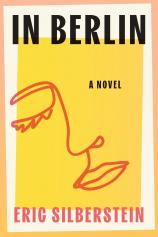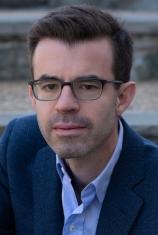Author Talk: August 20, 2025
IN BERLIN is an entangled story about two women whose lives are upended, one by an achingly rare spinal stroke and the other by political violence. In this interview conducted by Susie Felber, Eric Silberstein explains what inspired him to write his second novel, following THE INSECURE MIND OF SERGEI KRAEV, and why he chose Berlin as the setting. He also talks about making some of the mouth-watering Syrian dishes that are described in the novel and recalls a memorable discussion he had with a book club.
Question: What is IN BERLIN about?
Eric Silberstein: It’s about two women who become friends in a Berlin hospital in 2014. One is an energetic, athletic software engineer early in her career. She’s commuting home when she gets struck by this extremely unlikely medical event --- a stroke in her spinal cord that causes paralysis. The other woman had been a med student in Syria until her family left the country in the face of escalating violence. Now she’s in Germany and learning German in the hopes she can resume med school there. In the meantime, she’s working a minimum-wage job in the same hospital where the engineer is undergoing rehabilitation. The novel is about how these two kindred spirits meet, grow close, and help each other regain mobility.
Q: What inspired you to write this book?
ES: I absolutely did not set out to write this novel, and nobody would look at me and say, “Yes, this is the guy who should write this story.” I started out with a novel about an engineer from Boston who, on a trip to Berlin, becomes friends with a recent Syrian immigrant. But following my interests and just the creative process led me somewhere totally different.
What happened was that after two drafts and positive feedback from early readers, I traveled to Berlin to flesh out a few details. As part of that, I visited a hospital where one of my characters might have been treated after a bike accident, and there I met a woman who had been recently paralyzed by a spinal stroke. We spoke for like two hours, and it was one of the most perspective-changing conversations of my life.
We stayed in touch, became friends, and later, after she read my first novel from her hospital bed, she began to share even more about her experience so it could shape my fictional character. Over time, I found more meaning in her journey than in my original protagonist. After discussing with her, I decided to throw out my manuscript and start over with a main character who suffers a spinal stroke, while retaining some of my Syrian characters.
Q: But why choose Berlin in the first place?
ES: Yeah, it’s funny. My younger self wouldn’t have gone in this direction. My grandparents were Holocaust survivors, and my father was born as a stateless displaced person in Munich. I grew up hearing stories of my family coming to the United States as refugees. I also heard stories about the “good” Germans and “bad” Germans who controlled the fate of my grandparents, working as slave laborers in a munitions factory.
But the world is not static. In 2015, when huge numbers of refugees were coming into Europe, Chancellor Angela Merkel made her famous statement “Wir schaffen das" --- “We can do this,” talking about rising to the challenge of accepting refugees. Those words moved me and planted a seed.
Q: The novel includes descriptions of mouth-watering Syrian dishes, and your book club guide has recipes for some of them. But be honest. Did you actually cook them?
ES: Yup. I made, or at least tried to make, all of them. One of the Syrian women who helped me with the novel is an excellent cook. She told me what dishes my characters would eat, pointed me to recipes, and even gave feedback on the photos I sent back.
I made baklava at least five times and got pretty good at it. I love the crackling sound when you pour the syrup over the hot, just-baked sheets of phyllo. I tried a bunch of the kibbeh dishes, and what came out was tasty but not attractive. It takes some serious skills to handle the bulgur-and-ground-lamb dough. Here’s a photo from a meal at the home of a Syrian friend in Berlin.
Q: You started and sold two software companies, one of which had to do with translation and the other with medical research, so I see the subject matter interest. But is there a connection between starting a company and writing a novel?
ES: Startups, software and novels might seem pretty different --- but in my mind they’re closely related because they’re about creating something from nothing. Each requires following threads to uncertain destinations. Each involves the highs and lows of putting yourself out there: one minute thinking you have something good and it propels you forward, the next day deciding everything you did was crap.
Something I’ve done as a novelist that I definitely copied from building companies and software is aim to get honest feedback. This is why I think I’ve had more beta readers than most. I also research intensely because I love seeing through the eyes of others, whether a customer with a problem to be solved or the model for a fictional character.
Q: Are you available to join book club discussions?
ES: Yes! In fact, I’m indebted to a book club that offered to read my draft. The “International Camberville Book Club” is six friends who originally met in Boston and are now spread out around the world. Their book club is how they stay connected, and they’ve read and discussed a book a month for over six years.
They gave no feedback ahead of time, so I was nervous when I joined their Zoom. I listened to them talk about my characters, debate motivations, and argue over the ending. As an author, you invent stuff and transmit it through words. Seeing proof that other people received the transmission is such a good feeling. And I came away from the discussion with insights that shaped my revisions.
If you want to include me in a book club discussion, please reach out via the contact email on my author site, ericsilberstein.com.








